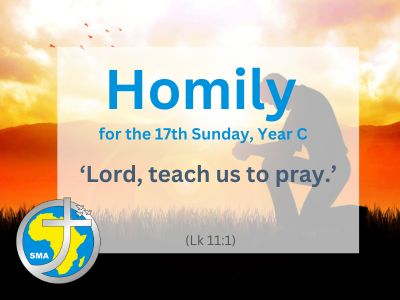Readings: Genesis 18: 20-32; Colossians 2:12-14; Luke 11:1-13
Theme: Lord, teach us to pray (Lk 11:1)
By Michael McCabe, SMA.
My first School Catechism defined prayer as ‘the raising up of mind and heart to God’. Quite good, as far as definitions go. Of course, it’s more important to pray than to know how to define prayer. To my surprise, I learned more about prayer from a community of lepers in Liberia than from dozens of books and talks on prayer. While teaching in a seminary there about 40 years ago, I had the privilege, along with a small group of seminarians, of participating once a week in a prayer service at a Leprosarium a few kilometres away. I was struck by the remarkable freedom and enthusiasm of their prayers. This was indeed prayer of hearts, and minds, and voices lifted up to the Lord.
Prayer is the dominant theme of our readings today. In the first reading from the book of Genesis we see Abraham interceding with the Lord on behalf of two cities (Sodom and Gomorrah), notorious for the evil ways of their inhabitants. And his pleading is successful. The Lord agrees not to destroy these cities for the sake of ten good people. The picture we get of God here is that of a King whose justice is tempered with mercy. An even more generous portrait of God emerges in our second reading, where St Paul tells us that by sending his Son to die for us, ‘God has forgiven us all our sins… and cancelled every record of debt we had to pay’ (Col 2:14).
In our gospel reading from Luke, Jesus urges his disciples to pray with childlike trust and persistence. He also teaches them the ‘Our Father’, the prayer that most clearly identifies all who bear the name Christian. Asked to suggest a short summary of the Christian Faith, Rowan Williams, the former Anglican Archbishop of Canterbury, replied that he could think of no better summary than the prayer, the ‘Our Father’. The gospels have two versions of this great prayer, Matthew’s and Luke’s. Luke’s the shorter version, though we are more familiar with Matthew’s. Unfortunately, we say this prayer so often and so quickly, that we miss much of its meaning and its challenge. Properly understood, the ‘Lord’s Prayer’ is a summary of the entire message of Jesus. I wish to highlight three characteristics of this prayer that make it particularly relevant for the world in which we live. First, it is a prayer that liberates us; second, it is a prayer that challenges us, and third, it is a revolutionary prayer.
1. A Liberating Prayer
The ‘Our Father’ is a prayer we normally say standing up. And rightly so, for it is a prayer which enables us to stand with freedom and dignity in a world where God’s will is far from being a reality. We are enabled to pray this prayer and to address God as ‘Father’ because we stand with Jesus Christ who has made us his brothers and sisters, God’s children. This means that, as St. Paul tells us in his Letter to the Romans, that nothing can separate us from the love of God. Yes, there is much evil in our world, but with Christ it shall never be overwhelm us, since he has conquered not only the worst that humans can do, but the very power of the Evil One (Satan). So, we are freed from anxiety because we stand and pray the ‘Our Father’ with Jesus Christ, in whom we have a sure anchor in this turbulent, difficult, and, at times, nightmarish world.
2. A Challenging Prayer
The ‘Our Father’ challenges us to live act as God’s children, to become what we claim to be. We say ‘our’ Father not just ‘my’ Father. So, we cannot truly pray the ‘Our Father’ unless we concern ourselves with the needs of others, unless we are willing to share our bread with the hungry, to forgive one another, and to seek God’s glory rather than our own. We cannot honestly pray the ‘Our Father’ unless we are prepared to struggle against the evil in the world and act so as to make God’s reign a reality in the concrete circumstances in which we live. To put it in a nutshell, the ‘Our Father’ challenges us to let God act through us to bring about his reign of love and justice on earth.
3. A Revolutionary Prayer
In the ‘Our Father’, the central petition is: ‘Thy Kingdom come’. To make this petition is to envisage the most revolutionary change imaginable in our world. It is to envisage a world where God’s dream for us is realised, where forgiveness is the first imperative in all our relationships, where the evils of division and structural injustice are radically excised. The world we pray for in the ‘Our Father’ is not just a better world. It is a world of transformed relationships: of human beings with God, with one another and with the earth which is our common home.
To pray the ‘Our Father’ with confidence, and to mean what we say, requires loving trust, courage, and commitment. We can only pray this prayer because we stand in that intimate place where Jesus stands in relation to God. With him, who has made himself one with us, we dare to address God, not as ‘Lord’ but as ‘Abba’ (dear Father). Let us try for be more aware of what we are saying when we pray this greatest of all prayers.
Listen to an alternative audio Homily by Tom Casey, SMA:

